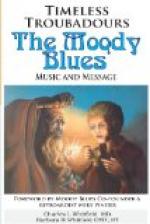of spirit. But that affrights him [87] not:
capons and game, good wine and the dainties of the
earth console him and cheer his heart. Then he
prays to God and says ’I am poor and in misery.’
Were God to answer him He would say, ‘thou liest!’”
To illustrate the degeneracy of the age, Peire relates
a fable, perhaps the only instance of this literary
form among the troubadours, upon the theme that if
all the world were mad, the one sane man would be in
a lunatic asylum: “there was a certain
town, I know not where, upon which a rain fell of
such a nature that all the inhabitants upon whom it
fell, lost their reason. All lost their reason
except one, who escaped because he was asleep in his
house when the rain came. When he awoke, he rose:
the rain had ceased, and he went out among the people
who were all committing follies. One was clothed,
another naked, another was spitting at the sky:
some were throwing sticks and stones, tearing their
coats, striking and pushing... The sane man was
deeply surprised and saw that they were mad; nor could
he find a single man in his senses. Yet greater
was their surprise at him, and as they saw that he
did not follow their example, they concluded that
he had lost his senses.... So one strikes him
in front, another behind; he is dashed to the ground
and trampled under foot... at length he flees to his
house covered with mud, bruised [88] and half dead
and thankful for his escape”: The mad town,
says Peire Cardenal, is the present world: the
highest form of intelligence is the love and fear
of God, but this has been replaced by greed, pride
and malice; consequently the “sense of God”
seems madness to the world and he who refuses to follow
the “sense of the world” is treated as
a madman.
Peire Cardenal is thus by temperament a moral preacher;
he is not merely critical of errors, but has also
a positive faith to propound. He is not an opponent
of the papacy as an institution: the confession
of faith which he utters in one of his sirventes
shows that he would have been perfectly satisfied
with the Roman ecclesiastical and doctrinal system,
had it been properly worked. In this respect he
differs from a contemporary troubadour, Guillem Figueira,
whose violent satire against Rome shows him as opposed
to the whole system from the papacy downwards.
He was a native of Toulouse and migrated to Lombardy
and to the court of Frederick II. when the crusade
drove him from his home. “I wonder not,
Rome, that men go astray, for thou hast cast the world
into strife and misery; virtue and good works die
and are buried because of thee, treacherous Rome,
thou guiding-star, thou root and branch of all iniquity...
Greed blindeth thy eyes, and too close dost thou shear
thy [89] sheep... thou forgivest sins for money,
thou loadest thyself with a shameful burden.
Rome, we know of a truth that with the bait of false
forgiveness, thou hast snared in misery the nobility
of France, the people of Paris and the noble King




